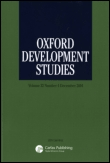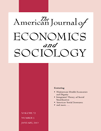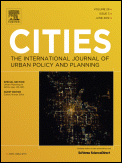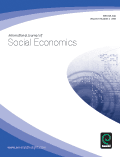
Oxford Development Studies
Scope & Guideline
Transforming Knowledge into Action for Sustainable Development.
Introduction
Aims and Scopes
- Interdisciplinary Research:
The journal encompasses a wide range of disciplines including economics, sociology, environmental science, and political science, facilitating a holistic understanding of development issues. - Focus on Low- and Middle-Income Countries:
Research is primarily centered around the challenges and opportunities faced by low- and middle-income countries, addressing issues such as poverty, inequality, and social justice. - Empirical and Policy-Oriented Studies:
The journal prioritizes empirical research that informs policy-making, aiming to bridge the gap between academic research and practical applications in development. - Social Equity and Inclusion:
Significant attention is given to themes of social equity, gender equality, and the empowerment of marginalized communities, reflecting the journal's commitment to inclusive development. - Environmental Sustainability:
Research addressing the intersection of development and environmental sustainability is a core area, highlighting the importance of ecological considerations in development practices.
Trending and Emerging
- Impact of COVID-19 on Development:
A significant increase in research addressing the socio-economic impacts of the COVID-19 pandemic on vulnerable populations, with a focus on health, education, and livelihoods. - Climate Change and Development:
Emerging themes related to climate change, including its intersection with inequality and urbanization, are gaining prominence, reflecting urgent global environmental concerns. - Financial Inclusion and Economic Empowerment:
Research exploring financial literacy, microfinance, and economic empowerment, particularly among marginalized groups such as women and refugees, is on the rise. - Social Movements and Resource Conflicts:
An increasing focus on social movements and conflicts over natural resources, highlighting the role of community activism in development processes. - Intersectionality in Development Studies:
There is a growing trend towards employing intersectional approaches that consider multiple identities (e.g., gender, disability, class) in understanding development outcomes.
Declining or Waning
- Traditional Economic Growth Models:
There has been a noticeable reduction in papers focusing solely on traditional economic growth models without considering social or environmental implications, indicating a shift towards more integrated approaches. - Rural Development without Gender Perspectives:
Papers that discuss rural development without incorporating gender perspectives have become less frequent, reflecting a growing recognition of the importance of gender analysis in development studies. - Macro-Level Economic Analyses:
Research that primarily addresses macroeconomic indicators in isolation from micro-level impacts on communities has declined, as there is a growing emphasis on understanding local contexts and experiences. - Historical Development Narratives:
The focus on historical analyses of development processes has waned, possibly due to a preference for contemporary issues and urgent challenges posed by globalization and climate change. - Top-Down Policy Implementation Studies:
There is a decreasing trend in studies that examine policy implementation from a top-down perspective, with more research focusing on participatory and grassroots approaches.
Similar Journals

BMJ Global Health
Fostering collaboration for a healthier global community.BMJ Global Health is a premier open-access journal published by the BMJ Publishing Group, dedicated to advancing the field of global health through the dissemination of high-quality research, innovative ideas, and impactful policy analysis. Established in 2016 and based in the United Kingdom, this journal has rapidly ascended to prominence, evidenced by its solid impact factor and ranking in the Q1 category for both Health Policy and Public Health, Environmental and Occupational Health. With its commitment to open access, BMJ Global Health ensures that vital research is freely available to enhance public discourse and inform decision-making processes around the world. The journal welcomes contributions that address pressing global health challenges and offers researchers an influential platform to shape health practices and policies. With Scopus rankings placing it in the top percentile of its categories, BMJ Global Health is indispensable for anyone seeking to stay at the forefront of health discourse and practice.

Forum for Social Economics
Innovating Perspectives in Social EconomicsForum for Social Economics is a premier academic journal published by Routledge Journals, Taylor & Francis Ltd, dedicated to advancing the discourse in social economics, a field that bridges the gap between economic theory and social realities. With an ISSN of 0736-0932 and an E-ISSN of 1874-6381, this journal serves as a vital resource for researchers, professionals, and students interested in the multifaceted intersections of economic and social phenomena. Recognized for its academic rigor, it holds a Q3 ranking in Economics and Econometrics and Q2 in Sociology and Political Science as of 2023, further emphasizing its influential position within these disciplines. Although not open access, the journal offers a wealth of insightful articles and empirical studies, fostering a deeper understanding of social issues through an economic lens. Since its inception in 1971 and with convergence years extending to 2024, the Forum for Social Economics continues to attract contributions that provoke critical thought and innovation in economic research. Based in the United States, the journal is pivotal for those looking to explore and contribute to the evolving landscape of social economics.

DEVELOPMENT AND CHANGE
Illuminating pathways to understanding and progress.DEVELOPMENT AND CHANGE is a premier journal published by Wiley, earning its place in the top rank of Development studies with a remarkable Scopus rank of #33 out of 306 and a Q1 categorization for 2023. Since its inception in 1970, this esteemed journal has provided a comprehensive platform for critical research and discourse on social, economic, and political developments shape global change. With an impressive impact factor reflecting its influence within the field, DEVELOPMENT AND CHANGE is dedicated to advancing the understanding of development in both historical and contemporary contexts, addressing crucial challenges faced as societies evolve. Although it does not offer open access, the journal remains accessible to a wide audience, including researchers, policy-makers, and practitioners, fostering a vibrant academic environment that encourages rigorous analysis and innovative thinking. By continually contributing to the discourse on pressing developmental issues, DEVELOPMENT AND CHANGE stands at the forefront of shaping scholarly dialogue and influencing policy across the globe.

AMERICAN JOURNAL OF ECONOMICS AND SOCIOLOGY
Innovating Research at the Crossroads of Economics and Society.American Journal of Economics and Sociology is a distinguished peer-reviewed journal published by Wiley that serves as a vital platform for researchers and professionals in the fields of economics and sociology. With a publication history spanning from 1941 to the present, this journal covers a diverse range of topics, promoting interdisciplinary research and fostering a deeper understanding of social and economic phenomena. Although it operates on a traditional subscription model, its contributions are widely recognized, earning it an impactful position within the academic community, reflected in its current 2023 Scopus Rankings— positioned in the top quartile for Sociology and Political Science and notable recognition in Economics and Econometrics. The journal is based in the United Kingdom and aims to enhance discourse and collaboration across economic and sociological domains, making it an essential resource for students, educators, and policymakers alike.

Discover Sustainability
Empowering research for global sustainability.Discover Sustainability is a prominent academic journal published by Springer Nature, dedicated to advancing knowledge in the fields of sustainability, energy, environmental science, and geography. Established in 2020, this Open Access journal aims to provide a platform for high-quality research that addresses pressing global challenges related to sustainable development. With an impressive Q2 ranking in various categories including Energy (miscellaneous), Environmental Science (miscellaneous), Geography, Planning and Development, and a respectable position in Renewable Energy, Sustainability and the Environment, it serves as a vital resource for researchers, professionals, and students alike. As the importance of sustainability initiatives continues to grow, Discover Sustainability offers a valuable repository of innovative ideas and empirical studies that contribute to the advancement of sustainable practices worldwide. Explore this journal to engage with groundbreaking research that shapes the future of our planet.

GLOBAL ENVIRONMENTAL CHANGE-HUMAN AND POLICY DIMENSIONS
Bridging Research and Policy for a Greener FutureGLOBAL ENVIRONMENTAL CHANGE-HUMAN AND POLICY DIMENSIONS is a premier academic journal published by Elsevier Science Ltd, based in the United Kingdom. With a significant focus on the interplay between human activities and environmental change, this journal serves as a critical platform for researchers and policymakers alike. It boasts an impressive impact factor and ranks in the top quartile (Q1) across multiple categories, including Ecology, Geography, and Environmental Science, reflecting its high relevance and influence within the respective fields. The journal provides insightful analyses and empirical studies from 1990 to 2024, fostering a deeper understanding of the socio-political dimensions of global environmental issues. Although it does not offer open access options, readers can still access the journal through various university libraries and institutional subscriptions, ensuring wide dissemination of important research findings. With its dedication to promoting interdisciplinary dialogue and evidence-based policy development, GLOBAL ENVIRONMENTAL CHANGE remains an invaluable resource for academics, practitioners, and students committed to addressing pressing environmental challenges.

Sociology of Development
Illuminating the intersections of society, economy, and politics.Sociology of Development is a premier academic journal published by University of California Press, Journals Division, dedicated to advancing the field of development studies through innovative sociological perspectives. With an E-ISSN of 2374-538X, this journal serves as a vital platform for researchers, professionals, and students alike, providing critical insights into social, economic, and political dimensions of development from 2019 to 2024. Achieving a commendable Q2 ranking in the 2023 development category and positioned at 164 out of 306 in Scopus rankings, it demonstrates its growing influence and commitment to fostering scholarly discourse. Although not openly accessible, Sociology of Development continuously aims to enrich its readership with rigorous research articles, reviews, and theoretical debates, making it an essential resource for anyone engaged in the complex world of developmental sociology.

CITIES
Bridging Theory and Practice in Urban StudiesCITIES is an esteemed academic journal published by Elsevier Science Ltd, focusing on interdisciplinary research pertaining to urban environments, their development, and associated sociopolitical dynamics. Since its inception in 1983, CITIES has become a vital resource for scholars and practitioners in the fields of Urban Studies, Sociology, Political Science, and Tourism, Leisure, and Hospitality Management, reflecting its distinguished status with a 2023 Q1 ranking in multiple categories. With an impressive Scopus rank placing it among the top percentile of journals in these domains, it serves as a platform for innovative research and dialogue on pressing urban issues. Although it currently does not offer open access, CITIES attracts a global readership dedicated to advancing knowledge on urbanism. Scholars and professionals seeking to contribute to the evolving discourse on urban life will find CITIES an essential publication, bridging theories and practice for a better understanding of our urban future.

INTERNATIONAL JOURNAL OF SOCIAL ECONOMICS
Pioneering Research for a Sustainable Economic FutureThe INTERNATIONAL JOURNAL OF SOCIAL ECONOMICS, published by EMERALD GROUP PUBLISHING LTD, stands out as a premier outlet for advancing the disciplines of economics and social sciences. Established in 1974 and set to continue through 2024, this esteemed journal has garnered a strong reputation, evidenced by its category quartiles in Q2 for both Economics and Econometrics, and Social Sciences (miscellaneous) as of 2023. With a Scopus ranking placing it in the 72nd percentile for General Social Sciences and 60th percentile for Economics, it serves as a vital resource for researchers, professionals, and students seeking to explore and understand the complex interplay between economic phenomena and societal factors. Although the journal does not offer open access, it strives to publish high-quality, rigorous research that addresses contemporary issues, making significant contributions to both academic scholarship and practical application. For those invested in the rich fields of social economics, this journal remains an essential platform for disseminating innovative ideas and solutions.

Information Technology for Development
Empowering Progress Through TechnologyInformation Technology for Development is a leading academic journal dedicated to advancing the understanding and application of information technology in the context of development challenges across the globe. Published by Routledge Journals, Taylor & Francis Ltd, this peer-reviewed journal has earned a prestigious Q1 ranking in multiple related fields, including Computer Science Applications, Development, E-learning, and Public Administration as of 2023. With an impact factor that underscores its relevance and influence, Information Technology for Development serves as a vital resource for researchers, professionals, and students who aim to explore innovative technological solutions to enhance socioeconomic conditions in developing regions. Covering a wide range of topics from digital inclusion to e-governance and technological policy, the journal offers a platform for disseminating critical research findings and practical applications that drive progress in this important field. By facilitating the exchange of ideas and research, it plays a significant role in shaping the future of information technology applications for societal development.